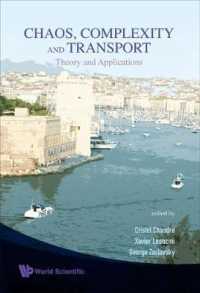基本説明
This volume reveals new perspectives from different theoretical frameworks on linguistic analyses of receptive multilingualism in Europe.
Full Description
Receptive multilingualism refers to the language constellation in which interlocutors use their respective mother tongue while speaking to each other. Since the mid-nineties receptive multilingualism is promoted by the European commission on par with other possibilities of increasing the mobility of the European citizens. Throughout the last ten years a marked increase in the research on this topic has been observable. This volume reveals new perspectives from different theoretical frameworks on linguistic analyses of receptive multilingualism in Europe. Case studies are presented from contemporary settings, along with analyses of historical examples, theoretical considerations and, finally, descriptions of didactical concepts established in order to transfer and disseminate receptive multilingual competence. The book contains results from research carried out at the Research Center on Multilingualism at the University of Hamburg as well as contributions by various international scholars working in the field of receptive multilingualism.
Contents
1. About the authors; 2. Introduction (by Zeevaert, Ludger); 3. Part 1 Historical development of receptive multilingualism; 4. 1. Receptive multilingualism in Northern Europe in the Middle Ages: A description of a scenario (by Braunmuller, Kurt); 5. 2. Linguistic diversity in Habsburg Austria as a model for modern European language policy (by Schjerve-Rindler, Rosita); 6. Part 2 Receptive multilingualism in discourse; 7. 3. Receptive multilingualism in Dutch-German intercultural team cooperation (by Ribbert, Anne); 8. 4. Receptive multilingualism and inter-Scandinavian semicommunication (by Zeevaert, Ludger); 9. 5. Receptive multilingualism in Switzerland and the case of Biel/Bienne (by Werlen, Iwar); 10. 6. The Swiss model of plurilingual communication (by Ludi, Georges); 11. 7. Receptive multilingualism in business discourses (by Dresemann, Bettina); 12. 8. Speaker stances in native and non-native English conversation: I + verb constructions (by Baumgarten, Nicole); 13. Part 3 Testing mutual understanding in receptive multilingual communication; 14. 9. Understanding differences in inter-Scandinavian language understanding (by Doetjes, Gerard); 15. 10. Scandinavian intercomprehension today (by Delsing, Lars-Olof); 16. Part 4 Determining the possibilities of reading comprehension in related languages; 17. 11. Interlingual text comprehension: Linguistic and extralinguistic determinants (by Bezooijen, Renee van); 18. 12. Processing levels in foreign-language reading (by Lutjeharms, Madeline); 19. 13. A computer-based exploration of the lexical possibilities of intercomprehension: Finding German cognates of Dutch words (by Moller, Robert); 20. 14. How can DaFnE and EuroComGerm contribute to the concept of receptive multilingualism? Theoretical and practical considerations (by Hufeisen, Britta); 21. Name index; 22. Subject index








